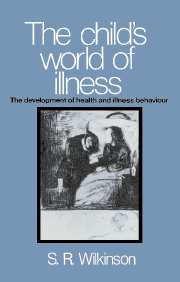Book contents
- Frontmatter
- Contents
- Acknowledgements
- Glossary
- 1 Presenting a problem
- 2 The form of dialogue
- 3 What has gone before: some background information
- 4 The primary structure to the child's world of illness
- 5 Germs and bugs: causal agents
- 6 Dirt and fresh air: the exogenous system
- 7 My castle and the good germs: the endogenous system and its boundary
- 8 ‘Pretend illness’: An analysis of how communication patterns can foster particular forms of complaints
- 9 The consultation: a form of dialogue
- 10 Health education and health promotion
- Appendixes
- References
- Index
6 - Dirt and fresh air: the exogenous system
Published online by Cambridge University Press: 23 September 2009
- Frontmatter
- Contents
- Acknowledgements
- Glossary
- 1 Presenting a problem
- 2 The form of dialogue
- 3 What has gone before: some background information
- 4 The primary structure to the child's world of illness
- 5 Germs and bugs: causal agents
- 6 Dirt and fresh air: the exogenous system
- 7 My castle and the good germs: the endogenous system and its boundary
- 8 ‘Pretend illness’: An analysis of how communication patterns can foster particular forms of complaints
- 9 The consultation: a form of dialogue
- 10 Health education and health promotion
- Appendixes
- References
- Index
Summary
‘So long as identity is absent, rubbish is not dangerous.’
(Douglas, 1966 p. 160)The previous chapter explored the children's views on causal agents such as germs and how they acted; this presented elements of the ‘personalistic’ medical system found in this population. These causal agents were regarded as representing the children's deductions of ‘facts’ from the various ways in which information was given to them. The systems in which the information was given were described in general terms in chapter 4, but without specific details of how illness rationales maintain boundaries between the systems and are used to facilitate particular social strategies. Here the threats to health inherent in the environment are discusssed.
How people respect the community's conventions about dirt appears to be particularly important for establishing the moral order around health in that social system. It is necessary to look more closely at what I mean by moral order, because I am here adopting an understanding of morality which differs from the stage models usually used. The concept of moral order comes from Harre (1983). (The interested reader who wishes a fuller presentation of why the stage model of development of morality is no longer adequate should refer to Harré's exposition.)
- Type
- Chapter
- Information
- The Child's World of IllnessThe Development of Health and Illness Behaviour, pp. 131 - 156Publisher: Cambridge University PressPrint publication year: 1988



